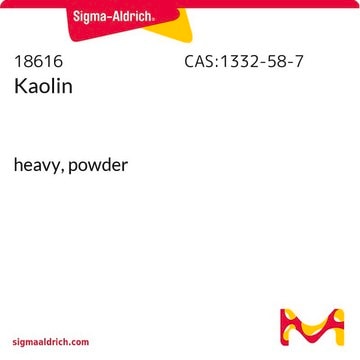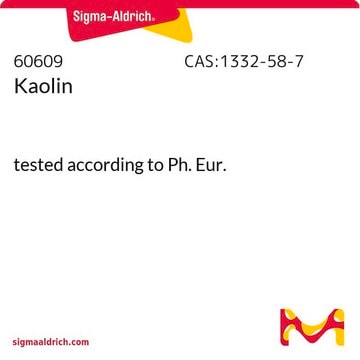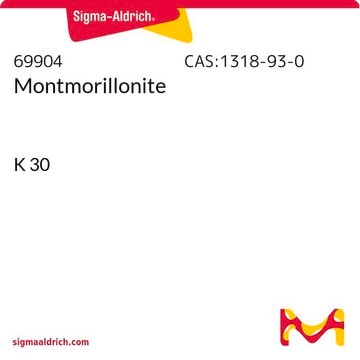About This Item
Recommended Products
form
nanopowder
Quality Level
diam. × L
30-70 nm × 1-3 μm , nanotube
surface area
64 m2/g
color
75-96, Hunter Brightness
refractive index
n20/D 1.54
pore size
1.26-1.34 mL/g pore volume
capacity
8.0 meq/g cation exchange capacity
density
2.53 (true specific gravity)
SMILES string
O.O.O[Si](O)(O[Al]=O)O[Si](O)(O)O[Al]=O
InChI
1S/2Al.H4O7Si2.2H2O.2O/c;;1-8(2,3)7-9(4,5)6;;;;/h;;1-2,4-5H;2*1H2;;/q2*+1;-2;;;;
InChI key
HEFIDAICLOZRRO-UHFFFAOYSA-N
General description
Similar to montmorillonite, halloysite consists of two layers of aluminosilicate in 1:1 Al:Si ratio. Significant improvements in thermal, mechanical properties have been reported on addition of halloysite nanotubes in polymer composites.
Application
Isotactic propylene-halloysite nanocomposites.
Alloy composites by electroless/ autocatalytic deposition.
Poly(butylene terephthalate) (PBT) composites.
Zinc–halloysite nanotube (HNT) composite coatings.
Halloysite nanotube–hydroxyapatite–hyaluronic acid films.
Halloysite combined with polyamide, polypropylene, poly(ε-caprolactone) and fluroelastomers.
Its tube like morphology, high aspect ratio, and low percolation enables interesting applications as reinforcements in nanocomposites.
Legal Information
Storage Class Code
11 - Combustible Solids
WGK
nwg
Flash Point(F)
Not applicable
Flash Point(C)
Not applicable
Personal Protective Equipment
Choose from one of the most recent versions:
Certificates of Analysis (COA)
Don't see the Right Version?
If you require a particular version, you can look up a specific certificate by the Lot or Batch number.
Already Own This Product?
Find documentation for the products that you have recently purchased in the Document Library.
Customers Also Viewed
Articles
Halloysite Nanotubes in Nanomaterials Research. Halloysite, a naturally occurring aluminosilicate nanotube, has been undeservedly forgotten.
Nanoclays like montmorillonite and bentonite are used in polymer-clay nanocomposites, rheology modifiers, and drug delivery carriers.
Nanoclays like montmorillonite and bentonite are used in polymer-clay nanocomposites, rheology modifiers, and drug delivery carriers.
Nanoclays like montmorillonite and bentonite are used in polymer-clay nanocomposites, rheology modifiers, and drug delivery carriers.
Our team of scientists has experience in all areas of research including Life Science, Material Science, Chemical Synthesis, Chromatography, Analytical and many others.
Contact Technical Service













